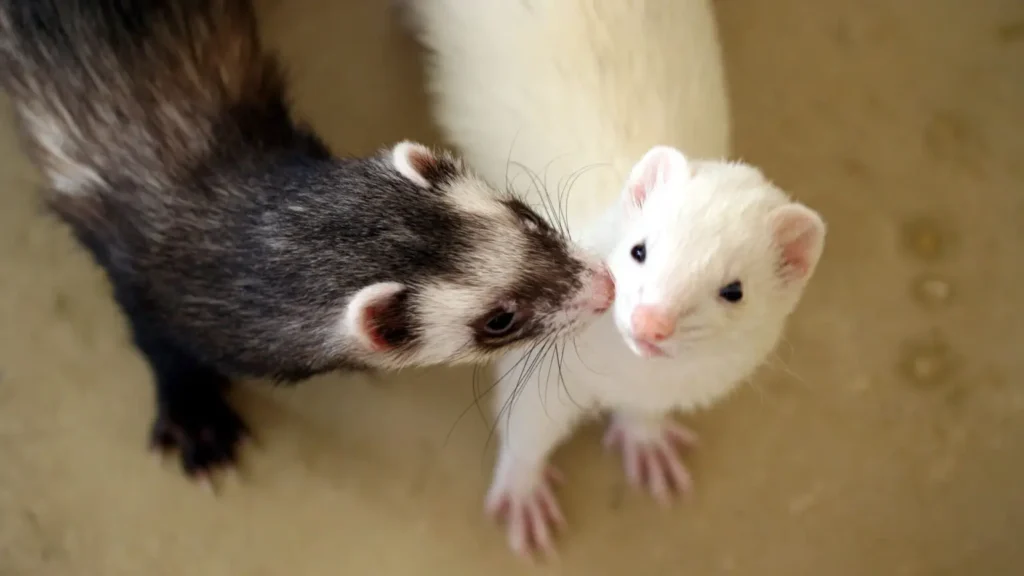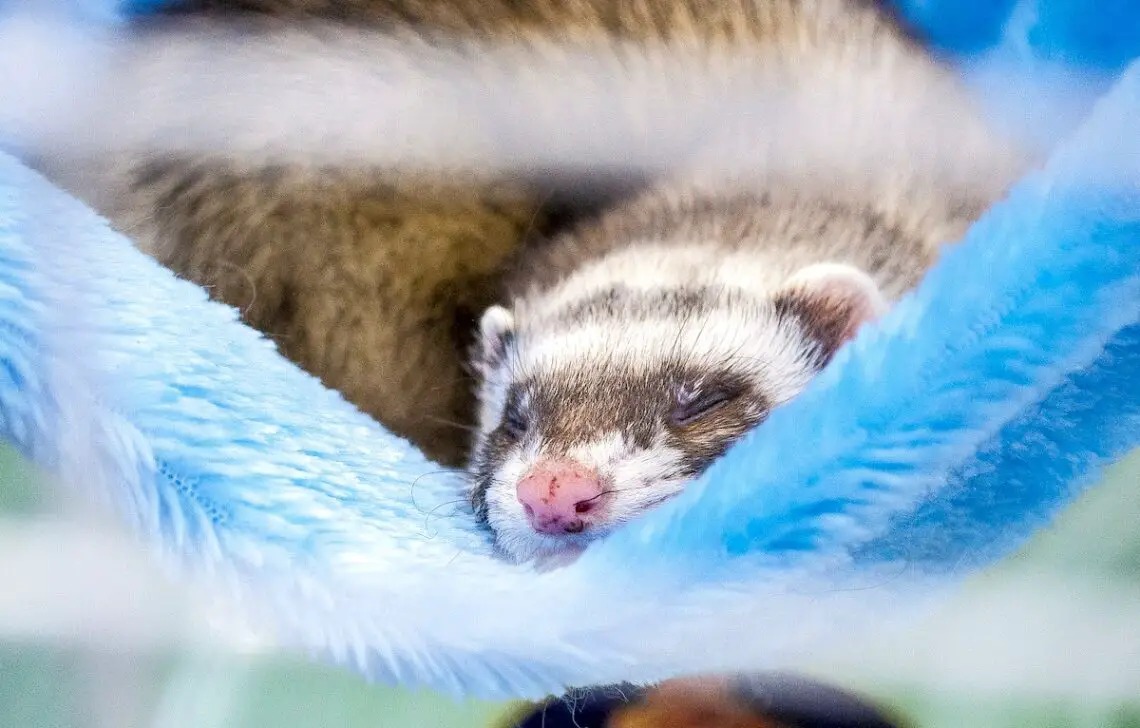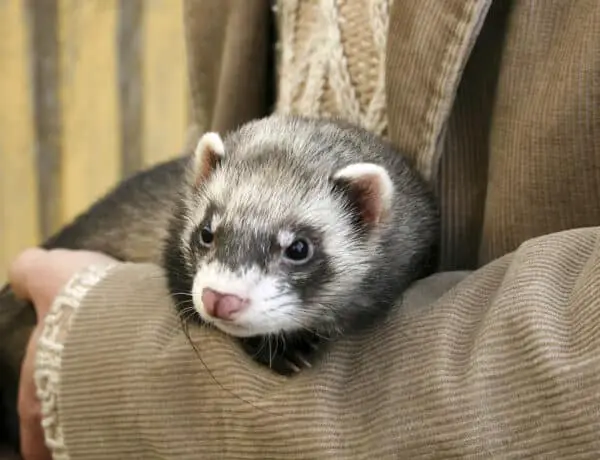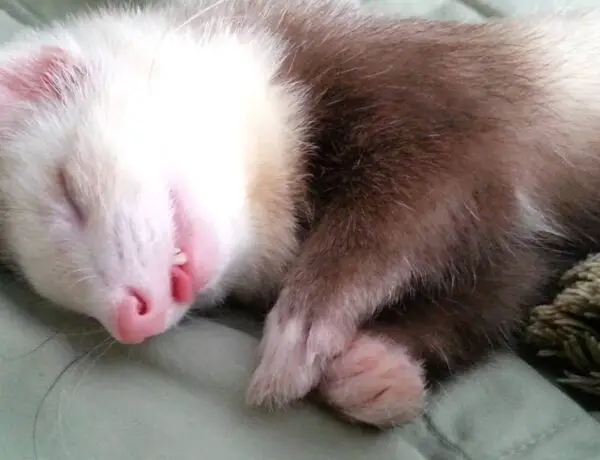Introduction
Why Do Ferrets Sleep So Much: Ferrets, those small and curious creatures, often leave people wondering about their peculiar sleeping habits. These adorable, mustelid mammals seem to have an almost insatiable appetite for sleep, often dozing off for the majority of their day. While many pet owners and enthusiasts may find themselves perplexed by this seemingly excessive slumber, there are intriguing biological and behavioral reasons behind why ferrets shake sleep so much. In this exploration, we will delve into the fascinating world of ferrets, unraveling the mysteries of their sleeping patterns and shedding light on the factors that influence their need for rest. So, if you’ve ever wondered why ferrets are such avid nappers, read on to uncover the captivating reasons behind their love for sleep. Ferrets, with their lithe bodies, inquisitive nature, and boundless energy when awake, can leave many wondering just how they manage to squeeze so much sleep into their daily routine.
Understanding the reasons behind their extended periods of rest requires a deeper look into their evolutionary history, natural habitat, and unique physiological characteristics. These remarkable creatures have a long history of domestication, which has shaped their behavior in various ways. Their wild ancestors were primarily crepuscular predators, which means they were most active during the dawn and dusk hours. This behavior has carried over to their domestic counterparts to some extent, leading to patterns of increased activity during these times and longer periods of sleep during the day and night. Furthermore, ferrets have a high metabolic rate, which demands substantial energy expenditure when they are awake and active.
To compensate for this, they need to conserve energy through sleep, ensuring they have the stamina for their bursts of playfulness and exploration. Intriguingly, ferrets are obligate carnivores, which means their diet primarily consists of animal-based proteins. This dietary specialization requires them to expend energy efficiently and, consequently, take frequent naps to conserve energy between meals. To unravel the mysteries of why ferrets sleep so much, we’ll explore these fascinating aspects in more detail, shedding light on the intricate interplay of biology and behavior that governs their unique sleep patterns. So, join us on this journey into the world of ferrets as we uncover the secrets behind their penchant for prolonged slumber.

Can you wake up a sleeping ferret?
When ferrets sleep, something they will enter a very deep sleep, which will make them appear as if they are dead. You can pick them up, move them, talk to them; and they won’t wake up right away. The only sign of life is the slow raising and lowering of their stomach because of their breathing.
Assess the Situation: Before attempting to wake up your ferret, consider why you need to do so. Is it an emergency, or can it wait until the ferret naturally awakens? If it’s a non-urgent situation, it’s usually best to let the ferret sleep undisturbed.
Emergency Situations: If there’s a genuine emergency, such as a medical issue or the ferret being in a potentially dangerous situation, you may need to wake it up. In such cases, proceed gently and prioritize the ferret’s safety and well-being.
Minimize Stress: When you need to wake a ferret, try to minimize stress as much as possible. Speak softly, and avoid sudden movements or loud noises that could startle the animal.
Approach Slowly: Approach the sleeping ferret slowly and gently. You can softly stroke its back or nudge it lightly to wake it up. Be patient and allow the ferret to wake up at its own pace.
Why is my ferret sleeping so much and not eating?
A ferret who is feeling ill or is in pain may not be eating and drinking. Ferrets are very small and don’t have large energy reserves in their body, so they can quickly become tired and weak if they stop eating.
Illness or Injury: The most common reason for changes in a ferret’s behavior is an underlying illness or injury. Ferrets are good at hiding their discomfort, so if they are sleeping excessively and not eating, it may be a sign that something is wrong. Common health issues in ferrets include gastrointestinal problems, infections, dental issues, and adrenal disease, among others.
Stress or Environmental Changes: Ferrets are sensitive to changes in their environment or routine. Stress or major changes in their surroundings, such as a new home, a new pet, or changes in their cage setup, can lead to changes in their behavior. They may become withdrawn, sleep more, and lose their appetite.
Age-Related Changes: As ferrets age, they may naturally become less active and eat less. However, this should be a gradual change, and sudden, significant changes in activity and appetite should still be investigated by a veterinarian.
Dietary Issues: Inappropriate or poor-quality diet can lead to health problems in ferrets. If they are not getting the nutrition they need, it can result in lethargy and reduced appetite.
How do I know if my ferret is happy?
When ferrets are feeling happy, they’ll often perform the ‘dance of joy’. This involves puffing up their tail, baring their teeth and throwing their head back and hopping around in all directions. If your ferret is pawing at the ground, they’re inviting you or another ferret to wrestle with them.
Playfulness: A happy ferret is typically playful and curious. They love to explore their environment, investigate new objects, and engage in interactive play with their owners or other ferrets. If your ferret is active and enthusiastic during playtime, it’s a positive sign.
Bouncy Movements: Happy ferrets often exhibit “the weasel war dance,” characterized by quick, bouncy, and playful movements, including leaps and twists. This behavior usually indicates excitement and contentment.
Purring and Clucking: Some ferrets emit a soft purring or clucking sound when they are content. This vocalization is often accompanied by a relaxed body posture.
Social Interaction: Ferrets are social animals and enjoy interacting with their human caregivers and other ferrets. If your ferret seeks out your company, responds positively to petting and cuddling, and enjoys playing with you or other ferrets, it’s a sign of happiness.
Healthy Appetite: A ferret’s appetite is a good indicator of its well-being. A happy ferret will eagerly eat its food and show enthusiasm during mealtime. Be aware of changes in eating habits, as a sudden loss of appetite can be a sign of illness or stress.
Do ferrets like light or dark?
The best thing for your ferret is to have its cage somewhere where it is exposed to natural light cycles, and avoid keeping it in artificial light as much as possible. One option is to cover the section of the cage where your ferret sleeps if you need to turn the lights on in the room.
Crepuscular Nature: Ferrets are crepuscular animals, which means they are most active during dawn and dusk. In their natural habitat, this behavior helps them avoid daytime predators while taking advantage of low light conditions to hunt for food. So, ferrets are naturally inclined to be more active during the twilight hours.
Moderate Lighting: Ferrets generally prefer moderate lighting conditions that mimic the dawn and dusk periods. They are not fans of extremely bright or harsh lighting. Overly bright lights can be uncomfortable for their sensitive eyes and may lead to stress or discomfort.
Dark Sleeping Areas: Ferrets require a dark and quiet place for sleeping. Providing a cozy, darkened sleeping area in their cage, such as a hideaway or enclosed nest box, is essential for their well-being. This dark space helps them relax and get the rest they need, as they are sensitive to light when trying to sleep.
Balanced Lighting: Striking a balance between light and darkness is crucial for ferrets’ health and happiness. You can achieve this by providing natural daylight during their waking hours and ensuring a dark, comfortable sleeping area for them to retreat to when it’s time to rest.
How do ferrets show affection?
Pet ferrets readily show affection for their human owners through gleeful greeting behavior and willingness to shower owners with ferret kisses. Young ferrets, on the other hand, are not likely to enjoy quiet cuddle time.
Cuddling: Ferrets often enjoy cuddling with their owners. They may curl up next to you or in your lap, seeking warmth and comfort. Some ferrets even like to snuggle under blankets with their humans.
Kissing: Ferrets demonstrate affection by giving “ferret kisses.” This involves gently nibbling or licking your fingers, toes, or face. It’s a sign of trust and affection and is often accompanied by purring.
Playfulness: When ferrets are happy and comfortable with their owners, they engage in play. Playful behavior, such as chasing, wrestling, and play-biting (gently and without aggression), is a way they express their affection and enjoyment of your company.
Following You: Affectionate ferrets often follow their owners around the house. They are curious creatures and want to be where the action is. If your ferret tails you from room to room, it’s a sign of their attachment.
Grooming: Ferrets groom themselves regularly, but they may also groom their owners as a sign of affection. If your ferret licks your skin or hair, it’s a bonding behavior that demonstrates their fondness for you.
Do ferrets bite to show affection?
Biting and nipping are different in which an aggressive bite will surely give you a lot of pain and will sometimes draw blood while nipping are just gentle bites in which the ferret shows his affection towards you or just looking for attention.
Exploration: Ferrets are naturally curious creatures, and they use their mouths to explore their environment. Nibbling or mouthing objects, including your fingers or toes, is often their way of investigating and learning about their surroundings.
Playfulness: Ferrets are highly playful animals, and play-biting is a common part of their playful interactions. They engage in mock battles with each other, which may involve nipping or wrestling. When they play with humans, they might use their mouths in a similar way.
Communication: Ferrets have limited ways to communicate with humans, and gentle nibbling can be a way for them to get your attention or express excitement. It’s a form of interaction rather than a display of affection.
Teething: Like puppies and kittens, young ferrets go through a teething phase. During this time, they may be more inclined to chew or bite objects, including your fingers, to relieve the discomfort of teething.
How smelly are ferrets?
If you’ve never smelled it before, it’s kind of hard to describe. It’s not the most pleasant-smelling odor. It can be very strong if ferrets are not descented because this odor comes from two scent glands, one gland on each side of their anus around their rear end, that they typically use to mark areas within the wild.
Scent Glands: Ferrets possess specialized scent glands located near their anus, which secrete a musky odor. These glands are used for marking territory and communicating with other ferrets. The scent produced by these glands is often responsible for the characteristic ferret odor.
Diet: The type of food you provide to your ferret can influence its scent. A diet rich in low-quality kibble may contribute to a stronger odor, as it can result in less efficient digestion and changes in the scent of the ferret’s bodily secretions.
Age: Young ferrets, especially those under a year old, tend to have a stronger scent. As ferrets mature, their scent may become less pronounced. Spaying or neutering can also help reduce the intensity of the odor.
Hygiene: Regular grooming and hygiene practices can help manage ferret odor. Bathing your ferret too frequently can strip its skin of natural oils, leading to an increase in odor, so it’s important to find a balance.
Why do ferrets lay flat on the floor?
Since ferrets are often bundles of energy, you might notice that your ferret is a bit less energetic or simply just laying around, much like you do when you don’t feel well. This could indicate a simple cold or may mean something more serious.
Thermoregulation: One primary reason ferrets pancake is to regulate their body temperature. Ferrets are highly susceptible to temperature extremes due to their small size and thin fur. When they lay flat on a cool, hard surface, like a tile or linoleum floor, they can dissipate excess body heat. Conversely, when they stretch out on a warm surface, it helps them absorb heat when needed. So, pancaking serves as a thermoregulatory tool, allowing them to stay comfortable in various environmental conditions.
Comfort and Relaxation: Ferrets are known for their flexibility, and laying flat on their belly is often a sign of relaxation and comfort. They may do it when they feel safe, content, and in a state of repose. It’s similar to a human lounging on a comfy couch.
Observation and Exploration: Pancaking also allows ferrets to observe their surroundings and engage in exploratory behaviors. When they stretch out on the floor, they have a low profile and can more easily investigate interesting scents, objects, or movements nearby. It’s a way for them to stay aware of their environment while being in a relaxed position.
Playful Posture: Ferrets often pancake during playtime or when they’re feeling playful. This position allows them to pounce, roll, and engage in mock battles with other ferrets or toys. It’s a playful posture that signifies their readiness for fun and games.

Conclusion
The tendency of ferrets to sleep so much can be attributed to a complex interplay of factors deeply rooted in their evolutionary history and unique physiological needs. Their crepuscular ancestry, high metabolic rate, and obligate carnivorous diet have all contributed to the development of a sleep pattern that prioritizes rest and energy conservation. Understanding why ferrets sleep so much not only enriches our knowledge of these charming creatures but also helps us better care for them as pets. Providing a comfortable, safe, and stimulating environment that accommodates their need for rest and play is essential for their well-being. So, the next time you observe your furry ferret companion curled up in slumber, you can appreciate the intricate blend of biology and behavior that makes their sleep patterns a remarkable aspect of their nature.
Ferrets are living reminders that in the animal kingdom, sleep serves a vital purpose, even if it appears to occupy a significant portion of their day. Moreover, the enigmatic world of ferret sleep patterns serves as a reminder of the diversity and adaptability of life on our planet. It highlights how different species have evolved unique strategies to thrive in their respective environments. Ferrets’ ability to balance their energetic playfulness with extended periods of rest showcases the adaptability that has allowed them to become cherished companions to many. As we deepen our understanding of why ferrets sleep so much, we gain insights into the intricate ways animals have evolved to meet the challenges of their surroundings.
This knowledge not only fosters a greater appreciation for these endearing creatures but also underscores the importance of responsible pet ownership. Ensuring ferrets have the appropriate conditions to fulfill their natural sleep needs is an essential aspect of caring for them as pets. In the end, the mysteries behind ferret sleep patterns offer us a glimpse into the rich tapestry of the animal kingdom and invite us to marvel at the wonders of the natural world. Through scientific inquiry and responsible stewardship, we can continue to nurture our connection with these captivating creatures while respecting their unique biological needs. In our busy and fast-paced world, observing the tranquil slumber of ferrets can serve as a gentle reminder of the importance of rest in all living creatures.





No Comments